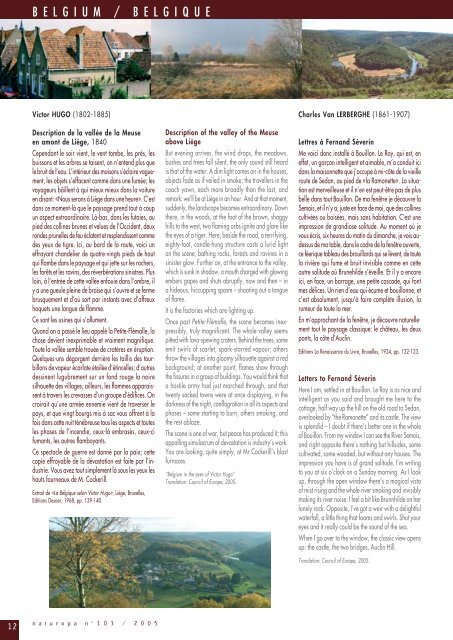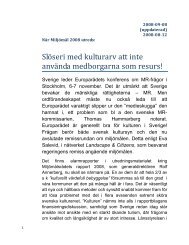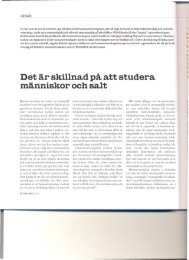Landscape through literature Le paysage à travers la littérature
Landscape through literature Le paysage à travers la littérature
Landscape through literature Le paysage à travers la littérature
You also want an ePaper? Increase the reach of your titles
YUMPU automatically turns print PDFs into web optimized ePapers that Google loves.
12<br />
B E L G I U M / B E L G I Q U E<br />
Victor HUGO (1802-1885)<br />
Description de <strong>la</strong> vallée de <strong>la</strong> Meuse<br />
en amont de Liège, 1840<br />
Cependant le soir vient, le vent tombe, les prés, les<br />
buissons et les arbres se taisent, on n’entend plus que<br />
le bruit de l’eau. L’intérieur des maisons s’éc<strong>la</strong>ire vaguement,<br />
les objets s’effacent comme dans une fumée; les<br />
voyageurs bâillent <strong>à</strong> qui mieux mieux dans <strong>la</strong> voiture<br />
en disant: «Nous serons <strong>à</strong> Liège dans une heure». C’est<br />
dans ce moment-l<strong>à</strong> que le <strong>paysage</strong> prend tout <strong>à</strong> coup<br />
un aspect extraordinaire. L<strong>à</strong>-bas, dans les futaies, au<br />
pied des collines brunes et velues de l’Occident, deux<br />
rondes prunelles de feu éc<strong>la</strong>tent et resplendissent comme<br />
des yeux de tigre. Ici, au bord de <strong>la</strong> route, voici un<br />
effrayant chandelier de quatre-vingts pieds de haut<br />
qui f<strong>la</strong>mbe dans le <strong>paysage</strong> et qui jette sur les rochers,<br />
les forêts et les ravins, des réverbérations sinistres. Plus<br />
loin, <strong>à</strong> l’entrée de cette vallée enfouie dans l’ombre, il<br />
y a une gueule pleine de braise qui s’ouvre et se ferme<br />
brusquement et d’où sort par instants avec d’affreux<br />
hoquets une <strong>la</strong>ngue de f<strong>la</strong>mme.<br />
Ce sont les usines qui s’allument.<br />
Quand on a passé le lieu appelé <strong>la</strong> Petite-Flémalle, <strong>la</strong><br />
chose devient inexprimable et vraiment magnifique.<br />
Toute <strong>la</strong> vallée semble trouée de cratères en éruption.<br />
Quelques-uns dégorgent derrière les taillis des tourbillons<br />
de vapeur écar<strong>la</strong>te étoilée d’étincelles; d’autres<br />
dessinent lugubrement sur un fond rouge <strong>la</strong> noire<br />
silhouette des vil<strong>la</strong>ges; ailleurs, les f<strong>la</strong>mmes apparaissent<br />
<strong>à</strong> <strong>travers</strong> les crevasses d’un groupe d’édifices. On<br />
croirait qu’une armée ennemie vient de <strong>travers</strong>er le<br />
pays, et que vingt bourgs mis <strong>à</strong> sac vous offrent <strong>à</strong> <strong>la</strong><br />
fois dans cette nuit ténébreuse tous les aspects et toutes<br />
les phases de l’incendie, ceux-l<strong>à</strong> embrasés, ceux-ci<br />
fumants, les autres f<strong>la</strong>mboyants.<br />
Ce spectacle de guerre est donné par <strong>la</strong> paix; cette<br />
copie effroyable de <strong>la</strong> dévastation est faite par l’industrie.<br />
Vous avez tout simplement l<strong>à</strong> sous les yeux les<br />
hauts fourneaux de M. Cockerill.<br />
Extrait de «La Belgique selon Victor Hugo», Liège, Bruxelles,<br />
Editions Desoer, 1968, pp. 139-140.<br />
n a t u r o p a n o 1 0 3 / 2 0 0 5<br />
Description of the valley of the Meuse<br />
above Liège<br />
But evening arrives, the wind drops, the meadows,<br />
bushes and trees fall silent, the only sound still heard<br />
is that of the water. A dim light comes on in the houses,<br />
objects fade as if veiled in smoke; the travellers in the<br />
coach yawn, each more broadly than the <strong>la</strong>st, and<br />
remark: we’ll be at Liège in an hour. And at that moment,<br />
suddenly, the <strong>la</strong>ndscape becomes extraordinary. Down<br />
there, in the woods, at the foot of the brown, shaggy<br />
hills to the west, two f<strong>la</strong>ming orbs ignite and g<strong>la</strong>re like<br />
the eyes of a tiger. Here, beside the road, a terrifying,<br />
eighty-foot, candle-hung structure casts a lurid light<br />
on the scene, bathing rocks, forests and ravines in a<br />
sinister glow. Further on, at the entrance to the valley,<br />
which is sunk in shadow, a mouth charged with glowing<br />
embers gapes and shuts abruptly, now and then – in<br />
a hideous, hiccupping spasm – shooting out a tongue<br />
of f<strong>la</strong>me.<br />
It is the factories which are lighting up.<br />
Once past Petite-Flémalle, the scene becomes inexpressibly,<br />
truly magnificent. The whole valley seems<br />
pitted with <strong>la</strong>va-spewing craters. Behind the trees, some<br />
emit swirls of scarlet, spark-starred vapour; others<br />
throw the vil<strong>la</strong>ges into gloomy silhouette against a red<br />
background; at another point, f<strong>la</strong>mes show <strong>through</strong><br />
the fissures in a group of buildings. You would think that<br />
a hostile army had just marched <strong>through</strong>, and that<br />
twenty sacked towns were at once disp<strong>la</strong>ying, in the<br />
darkness of the night, conf<strong>la</strong>gration in all its aspects and<br />
phases – some starting to burn, others smoking, and<br />
the rest ab<strong>la</strong>ze.<br />
The scene is one of war, but peace has produced it; this<br />
appalling simu<strong>la</strong>crum of devastation is industry’s work.<br />
You are looking, quite simply, at Mr Cockerill’s b<strong>la</strong>st<br />
furnaces.<br />
“Belgium in the eyes of Victor Hugo”<br />
Trans<strong>la</strong>tion: Council of Europe, 2005.<br />
Charles Van LERBERGHE (1861-1907)<br />
<strong>Le</strong>ttres <strong>à</strong> Fernand Séverin<br />
Me voici donc installé <strong>à</strong> Bouillon. <strong>Le</strong> Roy, qui est, en<br />
effet, un garçon intelligent et aimable, m’a conduit ici<br />
dans <strong>la</strong> maisonnette que j’occupe <strong>à</strong> mi-côte de <strong>la</strong> vieille<br />
route de Sedan, au pied de «<strong>la</strong> Ramonette». La situation<br />
est merveilleuse et il n’en est peut-être pas de plus<br />
belle dans tout Bouillon. De ma fenêtre je découvre <strong>la</strong><br />
Semois, et il n’y a, juste en face de moi, que des collines<br />
cultivées ou boisées, mais sans habitation. C’est une<br />
impression de grandiose solitude. Au moment où je<br />
vous écris, six heures du matin du dimanche, je vois audessus<br />
de ma table, dans le cadre de <strong>la</strong> fenêtre ouverte,<br />
ce féerique tableau des brouil<strong>la</strong>rds qui se lèvent, de toute<br />
<strong>la</strong> rivière qui fume et bruit invisible comme en cette<br />
autre solitude où Brunehilde s’éveille. Et il y a encore<br />
ici, en face, un barrage, une petite cascade, qui font<br />
mes délices. Un rien d’eau qui écume et bouillonne, et<br />
c’est absolument, jusqu’<strong>à</strong> faire complète illusion, <strong>la</strong><br />
rumeur de toute <strong>la</strong> mer.<br />
En m’approchant de <strong>la</strong> fenêtre, je découvre naturellement<br />
tout le <strong>paysage</strong> c<strong>la</strong>ssique: le château, les deux<br />
ponts, <strong>la</strong> côte d’Auclin.<br />
Editions La Renaissance du Livre, Bruxelles, 1924, pp. 122-123.<br />
<strong>Le</strong>tters to Fernand Séverin<br />
Here I am, settled in at Bouillon. <strong>Le</strong> Roy is as nice and<br />
intelligent as you said and brought me here to the<br />
cottage, half way up the hill on the old road to Sedan,<br />
overlooked by “the Ramonette” and its castle. The view<br />
is splendid – I doubt if there’s better one in the whole<br />
of Bouillon. From my window I can see the River Semois,<br />
and right opposite there’s nothing but hillsides, some<br />
cultivated, some wooded, but without any houses. The<br />
impression you have is of grand solitude. I’m writing<br />
to you at six o’clock on a Sunday morning. As I look<br />
up, <strong>through</strong> the open window there’s a magical vista<br />
of mist rising and the whole river smoking and invisibly<br />
making its river noise. I feel a bit like Brunnhilde on her<br />
lonely rock. Opposite, I’ve got a weir with a delightful<br />
waterfall, a little thing that foams and swirls. Shut your<br />
eyes and it really could be the sound of the sea.<br />
When I go over to the window, the c<strong>la</strong>ssic view opens<br />
up: the castle, the two bridges, Auclin Hill.<br />
Trans<strong>la</strong>tion: Council of Europe, 2005.





